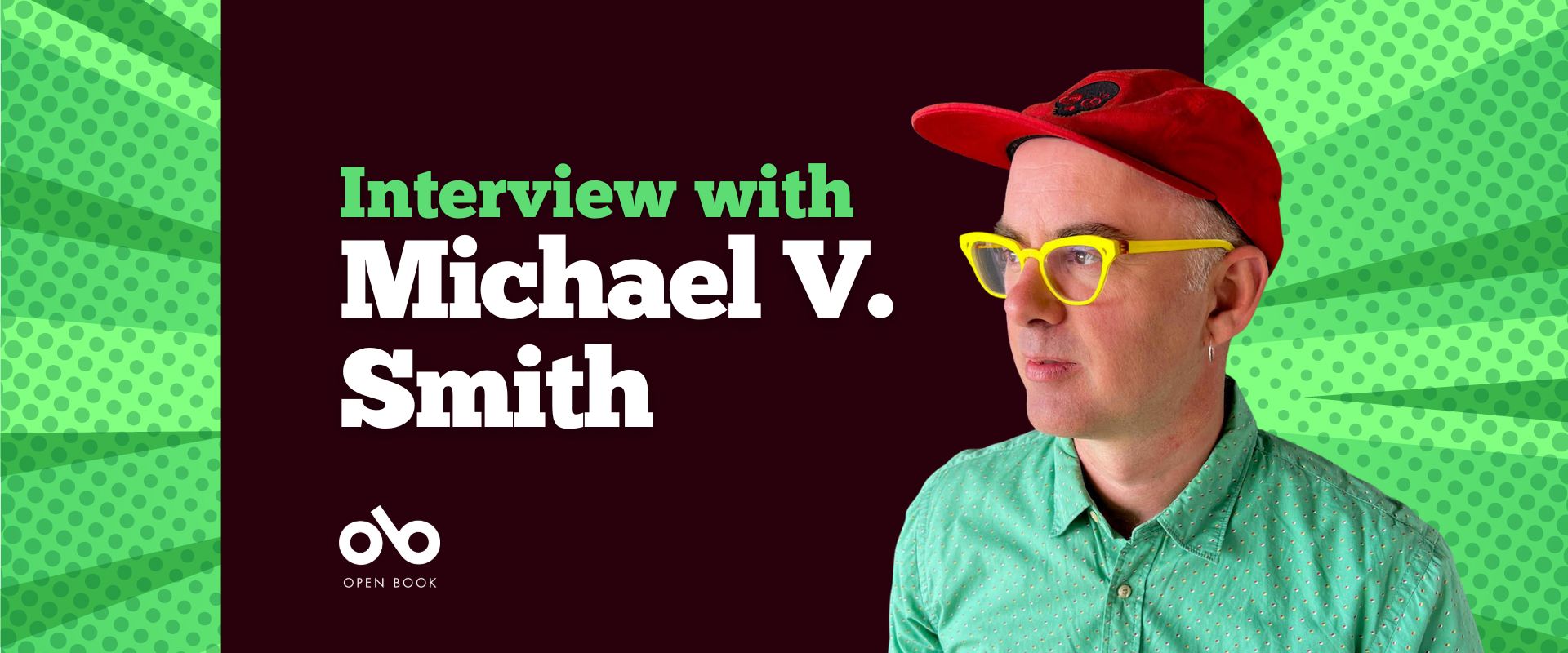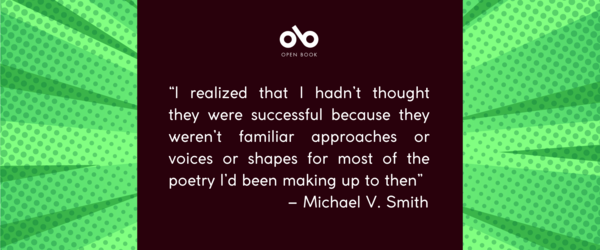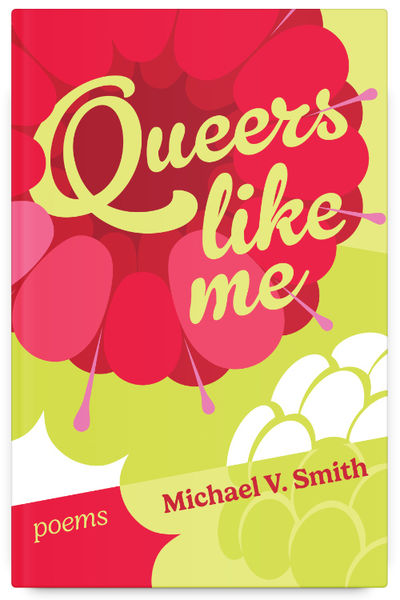Michael V. Smith on the Unexpected Journey of His Spectacular Seventh Book, Queers Like Me
Michael V. Smith's seventh book, the poetry collection Queers Like Me (Book*hug Press) was a surprise to him – it wasn't a book he expected to or even set out to write, but it's a gift to readers: devastating for how funny it is, wildly entertaining for how deeply, achingly affecting it is. A writer who has been compared to Frank O'Hara, Smith is an icon of queer CanLit, writing in multiple genres and collecting numerous honours.
Smith, who is also an acclaimed filmmaker and a popular drag queen in his Kelowna, BC community, takes readers on his journey from working class boyhood to urban adult life, charting his life as a queer child, a son, and more in intimate, authentic moments that cover everything from crushes to funerals, video games to bullies. Revelatory, relatable, honest, and raw, it's a brilliant additional to Smith's oeuvre and a genuinely absorbing poetic meditation on family, love, class, and identity.
We're speaking with Smith today about Queers Like Me and its surprising origins. He tells us about turning 50 during the pandemic and going back through old journals, about the advice he has for writers getting started and trying to find their voices, and why, in poetry, constraint can be a form of freedom.
Open Book:
Tell us about this collection and how it came to be.
Michael V. Smith:
This book was probably the most surprising, because I didn’t realize I’d written a book. A couple years ago, I turned 50 during the pandemic. I had extra time on my hands because we weren’t going out, so I decided to leaf back through the pages of my journals to see if there were any poems in there I had mislaid. I found a whack of things, none of which felt very realized to me, but I decided to type them into the computer to see what might come of them—maybe there was something I could splice together.
When I saw them on the computer, and had shaped them a little, I really loved them. Many were sweet and narrative. I realized that I hadn’t thought they were successful because they weren’t familiar approaches or voices or shapes for most of the poetry I’d been making up to then.
I had a good fifteen poems out of nowhere, all about growing up in Cornwall and moving to Toronto. Not long after, I made a long poem about my grandmother. Those projects together felt like a book, so I assembled the manuscript very fast and sent it to Book*hug.
The last magical moment was when Jay, my publisher, asked me if I could make the book longer—did I have any other poems kicking around—and I realized I had a long poem about my father’s death that I loved, and which fit the book beautifully. So suddenly within a short period of time, I went from no book to a full manuscript.
OB:
Do you find social media fits into your writing process at all? If so, how?
MVS:
At the start of the pandemic, I began a daily live storytelling broadcast on YouTube, called Have I Told You The One About. That ran for about three months. The long poem in this book, called "Grandma Cooper’s Corpse", came out of that storytelling show. I transcribed two of those stories, both involving the same characters in my family, merged them while trying to maintain the verbatim element, and then shaped them on the page to try to score my voice with poetic technique: so using a line break for emphasis, or indenting for an aside, playing with the breath and rhythm of a line, etc. It was exciting to make a poem by reciting through improvisation, then putting it on paper. Usually we do it the other way around. But I’m such a nut for improv, I really love making things up as we go, so this exercise in making was a thrill. I’ve been assigning my poetry students to do similar recordings, to make verbatim poems, and I have to say, I think they’re the best things they produce.
Your CanLit News
Subscribe to Open Book’s newsletter to get local book events, literary content, writing tips, and more in your inbox
Oh, and one of the poems came out of Facebook status updates, from my father and I both, cataloguing our statuses during his slow decline in and out of hospital. So that’s also sourcing language from social media.
OB:
Is there’s an individual, specific speaker in any of these poems (whether yourself or a character)? Tell us a little about the perspective from which the poems are spoken.
MVS:
The book is called Queers Like Me, and so the voice is closely aligned to how I speak. Certainly it’s identical in the verbatim and Facebook-status poems. I’ve been telling people that with this book, I’m not really writing poetry. I’m talking. There is a strong sense of voice in here, which has been a thrill, really.
Ever since I wrote my memoir, My Body Is Yours, I’ve found my writing has been leaning into voice, and into talking or orality, as a tool for connection with an audience, and even as a strategy in making. I love the immediacy of that language. I love performing the poems. I love the process of transcription too, using the page as a notational device, or a kind of visual scoring.
OB:
What advice would you give to an emerging or aspiring poet?
MVS:
I think my best advice for anyone starting out is to stop trying to make your work sound like someone else. How do you talk? What are your rhythms? What are your unique and particular stories? Where are you writing from in the world, even geographically? Where are you? What are the things that you know or have lived which you haven’t seen in books before? If you get ego out of the way—which can look like trying to sound smart, or trying to sound like people you admire, or trying to make capital A Art—if you can avoid trying to be someone else and really listen deep inside yourself, or come to writing like you’re having a conversation with your bestie, your voice will come to you much faster, much clearer. You find your confidence in writing by leaning into the You, not by emulating someone you aren’t. We can gather tools by copying, yes, but those should be in service of your individual story and experience. The more specific you can be about your own life, the better a writer you’ll likely be.
OB:
For you, is form freedom or constraint in poetry?
MVS:
Constraint is freedom, because in a world where anything is possible, it is harder to find the idea, and/or to embody it. The minute we limit the possibilities, the smaller the world, and then the easier we can explore that limited world. The more specific or constrained, the more fully we can explore or expand into that limitation. Potential is like a gas—it’ll expand into the space provided. Too much space, and it dissipates too broadly to be knowable.
Also, fundamentally, I usually think of form as a strategy for making—the form can help me find the content of a poem. Like with a sonnet, which has a turn in the middle, often building two halves of an argument. So you can find the topic of a sonnet by thinking, “What do I know to be true, that contradicts a stereotype?” For example. If we approach the form of a poem for its potential qualities, we can find a topic that fits within that structure. Likewise, if you have a poem that is shapeless, you can think of the structure as a tool for finding a deeper sense of the poem—how can rigid lines, for example, give the poem a greater sense of control, or aggression, even. How might loose lines affect the tone, or mood? Structure is also a tool for meaning making. In film, we know that if you change the order of the images, we change the story, and the meaning. The same is true in a poem. We read the visual shape of the thing, yes, but we also make meaning by the order in which we reveal our language and images. So structure is freedom, because it can act as a tool for discovery, as much as it helps embody a deeper depth to your ideas and mood.
_________________________________________
Michael V. Smith has published six previous books, which include three collections of poetry, a memoir, and two novels. Also an award-winning filmmaker, drag queen, and professor, Smith teaches at UBC Okanagan, in Kelowna, BC, where he lives with his brilliant husband.






